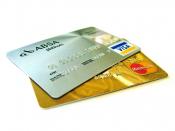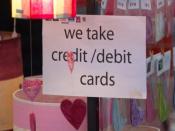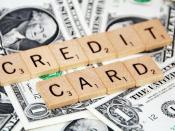The use of credit cards is much more dangerous than use of checks or cash. Paying with cash is very easy; for knowing how much money is available and how much can be spent makes it very hard to get into debt. When paying with a check the process is a bit trickier; the exact balance has to be kept on the account at all time. Knowing what this balance is and continuously replenishing it can be quite hard. Nevertheless, even with a check consumers can not get into a lot of trouble. If more money is spent then the shopper has on the current account, the last written check will be rejected and account will be suspended until the balance is paid off. With credit cards however, every year more and more people get into debt.
According to American Bankers Association (ABA), Americans owe more then $387 billion on their credit cards. This frightening number, averaging about $3,900 per family, is just as bad for the economy as it is for the consumers. In September of 1995, for example, The AT&T Universal card charged $15 per month for late fee to people who paid their bills just one day after the due date. Visa, on the other hand, was charging the penalty fees for as little as a dollar over the limit, plus an interest of up to 24.9 percent per year. In the second quarter of 1995, overdue payments as a percentage of outstanding balance hit 3.267 percent. That is the highest mark since recession of 1991.
'The picture is, some consumers are very, very deeply in debt,' says Charles McMillion, chief economist with MBG Information Services. A swipe of the card has become so natural that many consumers do not realize how much they have charged,


